Buonasera principi e principesse! Welcome to another installment of the famous ILTBTA! Tonight, we’ll take you on a daring adventure full of beautiful romance, dastardly villains, and the man bringing the fun and trying to hold his family together. You’ll laugh, you’ll cry, you’ll want to win a thousand points! What’s that? You heard this movie involves a concentration camp?? No, no, it’s all part of the game, come along and see that Life is Beautiful!

Previews
What, if anything, did we know about this coming attraction before we watched it?
Ellen: Couldn’t really tell you why, but I went through a period circa 2016 where I watched a lot of Honest Trailers for video games that I’ve never played and never will. One that stuck out to me among the Halo and Mario and Minecraft of it all was called Life is Strange. And because I watched one video 9 years ago and never actually played the game, over time I thought it was called Life is Beautiful, and that video game supplanted any info I might have picked up about this movie over that time. Whoops!
Tyler: I’m familiar enough with the broad strokes of the plot since we’ve tried to do a post on this a couple times now, but it was never available for streaming, seemingly doomed to be our next entrant into our infrequently-used “In Memoriam” section. But now we can watch it! Life really is beautiful!
Plots & Feelings
This one’s pretty self-explanatory.
Short Version (courtesy of IMDb): When an open-minded Jewish waiter and his son become victims of the Holocaust, he uses a perfect mixture of will, humor and imagination to protect his son from the dangers around their camp.
Long Version (modified from Wikipedia and formatted to fit your screen):
In 1939, two yahoos named Guido and Ferruccio race through the countryside of Fascist Italy in a busted old jalopy1, making their way to Arezzo, Tuscany. Along the way, they stop alongside a farm to repair their car. As Guido wanders, a woman falls from the window of a barn! He catches his princess and immediately begins flirting with her. She gives him a half dozen eggs2 as a thank you, and the boys are back in the car.
Ellen: Adding to the theme of me knowing nothing about this movie: they’re speaking Italian! Like, the whole time!
Tyler: Guido is charming in his own way but goodness gracious does he talk a lot. The captions could barely keep up with him. Thankfully he sprinkles in some humor every now and then to make it more bearable.
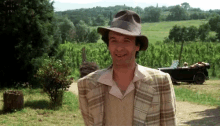
Once in Arezzo, Guido and Ferruccio settle into the home of Guido’s uncle Eliseo (aka Leo), which is stuffed with antiques and mismatched furniture. Guido embarks on server training at the fancy hotel where Leo also works. Ferruccio begins work at an upholstery business, and when he asks the owner what the political vibe is these days, his question is interrupted by the owner’s children … Benito and Adolf. Meanwhile, Guido has ambitions of one day opening a bookstore, but a rich and arrogant government official named Rodolfo is having none of it. He ends up with literal egg on his face though! And, even better, Guido spots his princess, Dora, around town! He even goes so far as to impersonate a magistrate from Rome who’s supposed to speak at the school where Dora teaches about the superiority of their race3. Being both goofy and Jewish, he instead just tells the kids a bunch of jokes and then yeets himself out the window.

As time passes, Guido continues his work at the hotel restaurant, and he’s pretty beloved! He even has an ongoing game of riddles with Dr. Lessing, a German man staying at the hotel. Guido also finds more excuses to run into Dora, who is unfortunately dating Rodolfo, but that’s just a detail, eh? He goes to a performance of Offenbach that he knows Dora will be attending, and then through luck and romcom circumstances he whisks her off on a magical date. Later, the hotel is abuzz with preparations for a big party and, oops: it’s an engagement party for Dora and Rodolfo! Guido is having none of this, and even though Uncle Leo’s horse4 was graffitied by some dumb antisemites, he manages to whisk Dora off once more out of her loveless relationship.
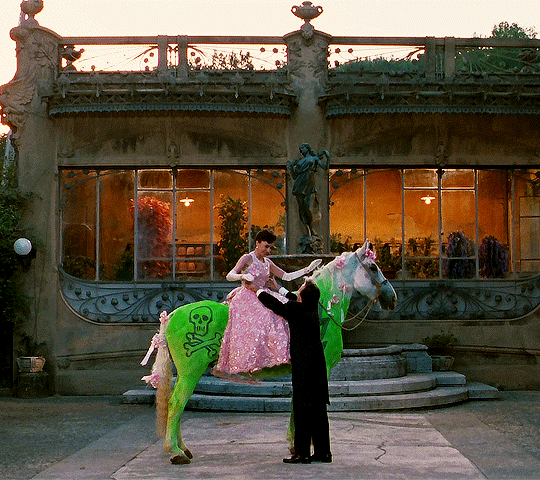
In a lovely shot where they enter the green house as a couple and then their child Giosuè (sounds like Joshua) runs out, we arrive in 1944 and the Nazi occupation of Northern Italy. Guido has successfully opened his bookshop, Dora is still teaching, and Giosuè is about to turn four (probably), and his favorite toy is a tank. While picking up her estranged mother to finally come celebrate Giosuè’s birthday, Dora returns to find the house ransacked and her husband and child gone. She goes to the train station to demand answers, and the guard checks his list and assures her that there’s been no mistake. Dora is not Jewish, but she demands to be put on the train as well, and they oblige her.
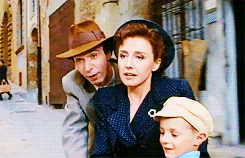
Dora, Guido, Uncle Leo, and Giosuè are all taken to a concentration camp. The men and women are separated. Giosuè is scared and confused, but Guido explains that it’s all a game he set up for his son’s birthday. Sure, the rules are strict and a little weird, but the first team to get to 1,000 points wins a dang tank! Guido manages to maneuver himself as “translator” for the German officer who comes to explain the rules, and he makes a big joke of it for Giosuè’s benefit, and the other prisoners just let it ride. Leo is separated from the other men and murdered in the gas chamber shortly after arrival. Guido is later perplexed and upset when Giosuè shows up where he’s doing hard manual labor. He’s mostly worried about breaking the illusion, but then he hears that the reason Giosuè is there is because he hid from taking a “shower” because he hates bathing, and now all the other kids are gone. Guido explains that it’s a new phase of the game where the kids have to hide, so Giosuè better hop to it!
Ellen: To Tyler’s point above, Guido talks a lot. But he’s also really good at thinking on his feet, which is proven even before he had a kid in this extraordinary situation.
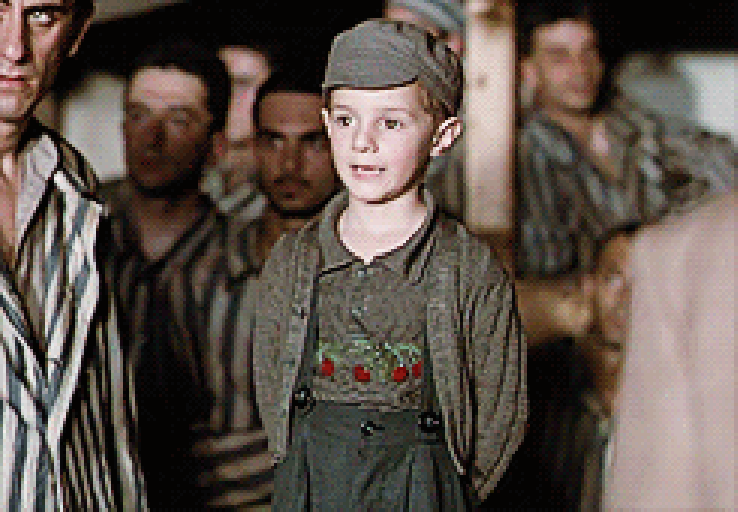
Dora is meanwhile completely cut off from her family, forced to sort through clothing outside the gas chambers and not knowing anything about Guido and Giosuè’s situation. That is until one day over the loudspeaker she hears an exuberant “Buongiorno Principessa!” come over the loudspeakers. Guido is not one to pass up an open door, and he risks it all to let Dora know they’re okay (relatively). This has the added bonus of putting some pep in Giosuè’s step, because he’s not always down to play this game. It kind of sucks, actually, but his Papa makes it fun!
Ellen: I really appreciate how Guido is equally committed to Dora and Giosuè. Of course his son needs taking care of more, plus they’re physically together, but Guido is as hellbent on improving Dora’s situation as he is Giosuè’s, even though he can do much less about it.
Tyler: I'm sure he feels responsible for her being there since she essentially volunteered for this so she could be with her family. And given how dedicated and persistent he was during their courtship, it fits with what we know of him as a character for him to go to great (and silly) lengths for her.
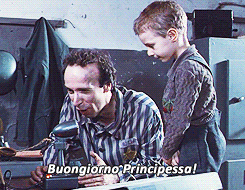
While getting a physical, Guido comes across his old pal Dr. Lessing! The doctor pulls some strings to get him a serving job for an officer event, because they have something important to discuss. Guido manages to use this opportunity to both convince Giosuè that other children (in this case, German officers’ kids) are hiding as part of the game and to give him the treat of a full meal. The jig is almost up when Giosuè says “grazie”, but by the time the narc who tried to expose him returns, Guido has taught all the German kids to say it. He also notices that the party has a record of the Offenbach opera that he and Dora saw, so he makes like Corinne Bailey Rae and plays it out toward the camp for Dora to hear. Dr. Lessing takes Guido aside to discuss something very important … a riddle he can’t figure out. He’s losing sleep over it! Guido is absolutely crestfallen for the first time in the whole movie.
Tyler: Guido realizing that the doctor only wants his help with a riddle and won't help him in any way is just absolutely gutting.
Ellen: It’s the first time his optimistic mask slips, and no obstacle he’s faced so far has made that happen. Having hope ripped away because this doctor is too wrapped up in his own “problems” to even notice the horrors in which he’s complicit is a horrible pill to swallow.
Time wears on, and the camp is thrown into chaos! Allied forces are approaching, and one of the other prisoners impresses upon Guido that the Germans will be trying to destroy the evidence. People are being loaded onto buses, and those buses come back empty. Guido helps Giosuè find a good hiding place and informs him that this is the final stage of the game. If he can stay there and not be found until everybody has left, then the tank will be his! Guido meanwhile searches frantically for Dora, even going so far as to dress like a woman (you know, if you squint) to investigate the other side of the camp. But he’s caught! As a German soldier marches him to an alley, Guido passes his son’s hiding spot and makes one last joke for him. He’s then taken around the corner and shot dead off-screen.
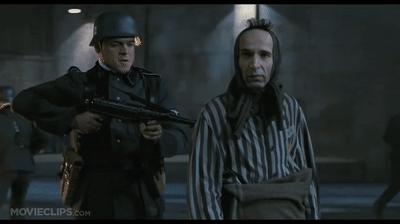
The next morning, the streets of the camp are quiet. Giosuè emerges from his hiding spot, and what’s that?? A tank rolls around the corner!! The kid is in awe at his “prize”, and the American soldier up top lets him ride in it. They roll along the road alongside the procession leaving the camp. Giosuè spots his mother in the crowd! He reunites with her and excitedly blabbers on about how they got a thousand points and won the game. The adult Giosuè reveals himself to be the narrator and reminisces on the sacrifices his father made for him.
Tyler: Maybe I missed it earlier/throughout the entire movie, but was there always a narrator? Or was that just an addition for the end?
Ellen: There was a tiny bit of narration at the beginning (which I assumed was Guido) calling the story a “kind of fable,” but as far as I remember it didn’t appear again until the end.
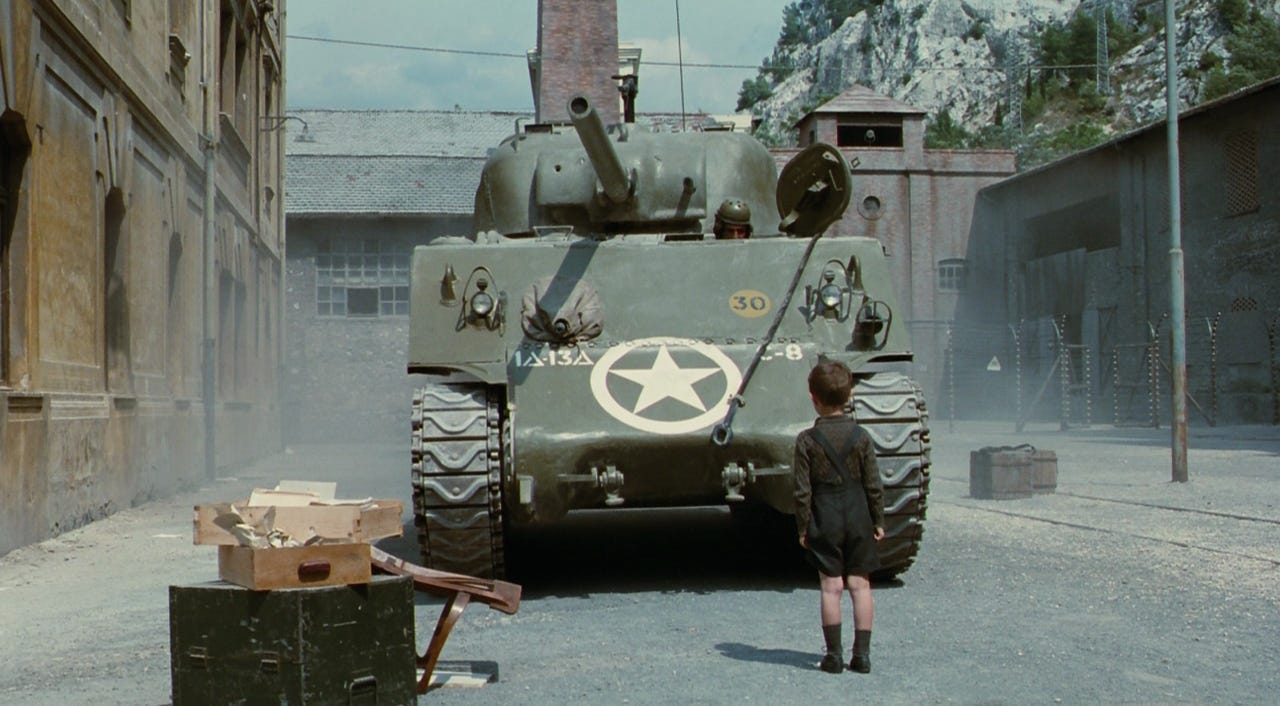
Intermission
Even though ILTBTA is free, please indulge us further and enjoy this quick “advertisement.”
This installment of ILTBTA is brought to you by … Guido's Bookstore!
Here at Guido's, we have a wide array of reading material to satisfy any bookworm. We've got books on the history of Jersey Shore, how-to books on twirling your pasta, fairy tales about princes and princesses, and more! Educate yourself on a wide variety of topics like, say, the dangers of authoritarianism … or antisemitism. Reading is knowledge!
Tell Guido (or the sweet child working behind the counter) that ILTBTA sent you and he'll tell you a riddle!
Wiki-Wiki-Whaaat?
Love a good Wikipedia rabbit hole in search of some fun facts? Us too.
Life Is Beautiful’s Wikipedia page has some interesting facts and anecdotes that we recommend you read through, but here are a few of our favorites:
Director, co-writer, and star of Life Is Beautiful, Roberto Benigni, became the first person to win the Oscar for Best Actor for a non-English language performance. In his acceptance speech, which occurred after he already accepted the award for Best Foreign Language Film, Benigni said, “This is a terrible mistake because I used up all my English!”
Ellen: This movie feels like it has such a cohesive vision behind it that I’m not surprised to hear one dude was the mastermind.
Benigni based the story partially on the novel In the End, I Beat Hitler by Rubino Romeo Salmoni, which incorporated elements of dark humor to recount his time at Auschwitz, as well as the experiences of his father, who spent two years in the Bergen-Belsen concentration camp. Benigni’s father would use humor to explain his experience to his children in order to avoid scaring them. His son later said: “To laugh and to cry comes from the same point of the soul, no? I'm a storyteller: the crux of the matter is to reach beauty, poetry, it doesn't matter if that is comedy or tragedy. They're the same if you reach the beauty.”
The text of the last riddle is “Fat, fat, ugly, ugly, all yellow in reality. If you ask me what I am I answer, 'Cheap, cheap, cheap.' Wailing along I go, 'Poopoo'. Who am I? Tell me true.” While Benigni contends that the riddle is nonsense and pointless, just like war, there is an interpretation that the answer is Jews.
Given that he is not Jewish, Benigni consulted with the Milan-based Center for Documentation of Contemporary Judaism (amongst other Jewish groups) in order to limit the offense the film might have caused. He even purposely incorporated some historical inaccuracies to distinguish his story from the actual Holocaust, about which he said only interviews with survivors could tell the truth.
Tyler: I noticed while watching that there weren’t any swastikas in the movie at all, so I wonder if this was part of the reason.
Amongst his other works, he also directed, wrote, and starred in a 2002 adaptation of Pinocchio that has a whopping 0% on Rotten Tomatoes, so ya can’t win ‘em all.
On the upside, Benigni is married to actress Nicoletta Braschi, who played his character’s wife Dora in Life Is Beautiful. Braschi starred in most of the films that he directed.
The names of the main characters, Guido and Dora, are taken from two of Braschi’s uncles, one of whom (Guido) died in the Mauthausen concentration camp.
Honorable Mentions
What other movies should you be watching?
Schindler’s List is one of those heavy movies that you may be avoiding watching, maybe because you know the broad strokes of the plot and it’s “too sad” or you’re scared away by the three-hour runtime. And while we understand that movies are all about escapism for many people and being bummed out for three hours is probably not your idea of entertainment (we’ve seen all the Marvel movies, we get it), movies can also be about telling incredible stories that make you really feel something. And that’s what Schindler’s List is.

For those who don’t know, Schindler’s List is the 1993 historical drama directed by Steven Spielberg that follows Oskar Schindler (played by Liam Neeson), a German industrialist who saves over a thousand mostly Polish-Jewish refugees from the Holocaust by employing them in his factories. Also starring in the movie are pre-Voldemort (but just as evil) Ralph Fiennes as an SS officer in charge of a concentration camp, and Ben Kingsley as Schindler’s accountant. After premiering in Washington D.C., Schindler’s List went on to receive critical acclaim for its acting, directing, cinematography, screenplay, and score, winning the Oscar for Best Picture amongst six others.
It also received critical acclaim from your favorite movie critics: us! Tyler called it “An incredible filmmaking feat and story” while reminiscing about the high school classmate who bemoaned the fact that it’s in black-and-white (shout out Shelley), while Ellen described it as “Gutting, impactful, beautifully made, holy cow.” Schindler’s List is available to rent from the usual platforms for less than a trip to Starbucks.
Oscar NomNomNomz
Since we all know a movie is nothing without the food and drink it incorporates.
It’s now time to award the Oscar for Best Snacktor in a Supporting Role5. And the nomnomnominees are:
Six eggs for an omelet you'll forget to make
Fresh salmon, a salad, and white wine while you solve a riddle
A slice of cake and glass of champagne from your engagement party that you ran away from
Old ass bread
And the Oscar goes to … the six eggs! Unfortunately, we immediately sacrificed the eggs to the inflation gods, so we will accept this award on its behalf.
Fill In The Blank
How did we really feel about The Academy nominating this?
Ellen: I’d like to give The Academy a tank! What do they do with it after that? That’s their problem! My immediate thought (and what I put in The Spreadsheet) was, “how dare they add Nazis to my slapstick Italian romcom?!” Sure, Guido is over the top and ridiculous and the courtship has the hand-wavy logic of a 90’s romcom, but it’s cute and I buy it! To take this absurd man, put him in a concentration camp, and watch him turn his talents toward caring for his family the best he can is both inspiring and gut-wrenching. You’d expect his optimism to fade, and in his private moments you do see him slump under the weight he’s carrying, but he’s focused on something bigger. The drastic change in setting and narrative thrust (going from “win over the girl” to “stay alive and protect your family”) should be more jarring than it is, but the movie has such a consistent voice that it takes you right along. I’ll probably think about this one for a while.
Tyler: I’d like to create an elaborate game to shield The Academy from the criticism it probably got for nominating a comedy-drama about the Holocaust for Best Picture. Sure some of the comedy and romantic gestures are a bit over-the-top for my American sensibilities, but it uses them effectively in the first half to suck you into their story while still laying increasingly large breadcrumbs about the seriousness of the underlying political situation. I also applaud Benigni for not only taking such a daring risk in incorporating comedy into a Holocaust movie, but for also largely threading the needle effectively. In that sense, it's reminiscent of Taika Waititi’s work on Jojo Rabbit (and The Great Dictator, the subject of the post we gave Jojo Rabbit an Honorable Mention in), which on top of mixing humor and heart in a heart-wrenching situation, also employed a child actor as a secret weapon of sorts.
And while those movies had particular standout aspects, Life Is Beautiful feels more like a “jack of all trades master of none” kind of movie. Nothing about the acting or music or art design or anything truly stood out, but when taken together it's ultimately greater than the sum of its parts.
Let The Credits Roll
Thanks for reading! Some quick housekeeping as you exit the theatre:
If you have plots and feelings of your own (on the movie or ILTBTA in general), feel free to comment on the post or simply reply to the email. If you liked reading this: tell your friends! If you hated reading this: tell your friends how much you hated it by forwarding it to them!
ILTBTA is on Letterboxd, the social networking/movie review site for movie fans. Follow us there to read our Spreadsheet comments of our ILTBTA movies, plus our ratings of other movies we watch!
If you’d like to start a wild Best Picture journey of your own, feel free to download a copy of The Spreadsheet. Bonus: checking off the boxes is oddly satisfying.
Post-Credits Scene
Get a sneak peek at the next ILTBTA installment.
In what we hope is a complete 180 turn from this discussion of the Holocaust, with our next post falling on the first day of the seventh month of the year, we’ll be covering the 1954 musical Seven Brides for Seven Brothers. 7BF7B follows six brothers in rural Oregon in the 1850s who decide they also want to get married after one of their brothers brings home his wife. (Maybe she’s got a great personality?) The film is available to stream for free on Tubi or rented from your movie rental service of choice if you don’t want to sit through ads.
Until then, happy belated Father’s Day!
Sounds like my ex-wife!
That’s equivalent to untold riches in today’s eggs!
Gross.
Ellen: Named Robin Hood! Which I found very cute.
Results tabulated and certified by the accountants at Ernst & Yum™.




